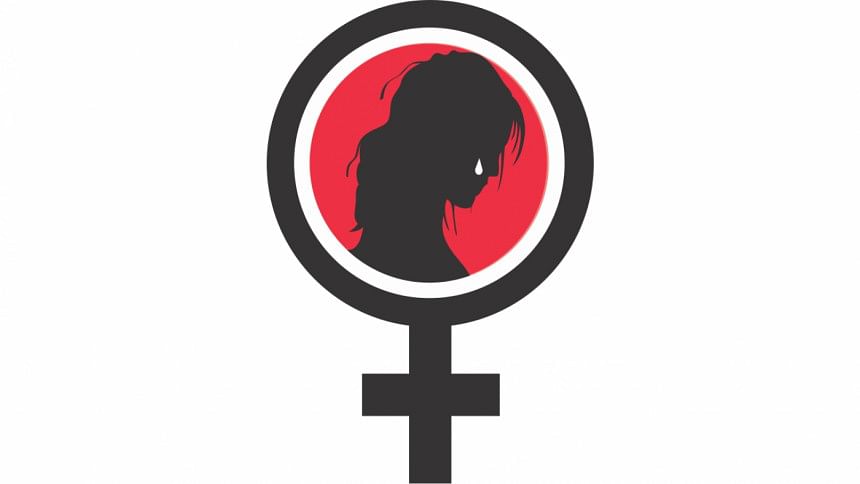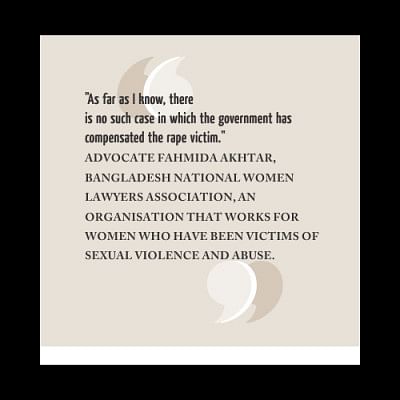Compensation hard to ensure

The dead do not feel anything, but those who survive do. The horrendous experience of the insensitive test after rape. The courtroom insults during trial because a draconian law permits the accused to question the victim's character. The families suffer no less humiliation as they wait for justice. While nations around the world have overhauled relevant laws with provisions that shield the rape victims, ours still favour the offender instead. Isn't it time we were a little more sensitive towards the victims of a crime now regarded as a crime against society? In the wake of Tonu murder after suspected rape, The Daily Star tries to shed some light on all these aspects.
Today, we run the third and final instalment of the three-part series.
She was gang raped by railway employees at the railway rest room in Kolkata while travelling in India on February 26, 1998.
The incident triggered outrage. Maitree, a network of 42 women's groups and NGOs in Kolkata, moved to Kolkata High Court seeking compensation for the 27-year old Shefali Begum (name changed to protect her identity).
The Kolkata HC in 1999 gave her 1 million rupees compensation for the humiliation she had undergone. But the Railway Board, which was asked to pay the compensation, challenged the order in the Supreme Court.
The Supreme Court in January 2000 upheld the HC verdict and said: "Even those who are not citizens of this country and come merely as tourists will be entitled to the protection of their lives in accordance with the constitutional provisions."
When the apex court ordered for the compensation, the criminal case against the rapists was still on in the lower court.
The judgement was very significant because such a huge amount was never given to a rape victim in India and that too awarded to a foreigner.

In numerous cases, Indian High Courts in different states and the Supreme Court have ordered the state governments concerned to pay compensations to rape victims for their failure to protect their dignity.
In India, the compensation process is independent of the trial process.
In Bangladesh the situation is different than that of countries like the UK and the USA. The government of Bangladesh does not need to pay compensation to a rape victim for its failure to protect the victim's fundamental rights as a woman.
"As far as I know, there is no such case in which the government has compensated the rape victim," said advocate Fahmida Akhtar, case manger of Bangladesh National Women Lawyers Association, an organisation that works for women who have been victims of sexual violence and abuse.
Asked, ZI Khan Panna, a Supreme Court lawyer, says they do not need to pray to the court seeking compensation from the state in sexual violence case as the offenders are made to pay compensation, if necessary.
"The court certainly will order the state to compensate the victims if the situation arises," he told The Daily Star.
Advocate Fahmida Akhtar says special tribunals dealing with offences against women and children, in some cases, have ordered the accused to compensate their victims.
"But the path to the compensation is long, as the accused filed appeals with the higher courts against the tribunal's orders. Disposal of the appeals takes a long time," she told The Daily Star.
Eminent jurist Shahdeen Malik says many countries compensate rape victims. Bangladesh should also take responsibility for compensating the rape victims, he added.
"Jurisprudence in this regard should evolve," he told The Daily Star referring to the practice in India.
The Supreme Court, in the State vs. Md. Moinul Haque and Others case in 2000, emphasised the need for compensating the victims for their rehabilitation.
It, however, observed that victims of rape should be compensated by giving them half of the property of the rapists should be given to the victims to rehabilitate them.
At present, the Woman and Child Oppression Prevention Act 2000 empowers tribunals set up under this law to hold trial of the sexual crimes against women and children for compensating the victims.
As per tThe law says, the tribunal may imposes any monetary fine on convicted persons and order the district collector to sell the confiscate the convicted person's movable and immovable assets and sell them on auction. Then the collector will deposit the money to with the tribunal that will award the money to the victim as compensation.
But the completion of the process may take a long time if the convicted person files an files appeal.
So, there is no scope for a sex crime victim to get any compensation before the conclusion of her case.
PRACTICE IN OTHER COUNTRIES
A rape victim in UK is entitled to get compensation from the government. To provide the compensations to blameless victims of violent crimes including rape, the government has set up Criminal Injuries Compensation Authority--CICA.
People who have been physically or mentally injured can apply to the CICA for compensation ranging from £1,000 to £500,000.
A victim of sexual assault or rape has a right to claim compensation. The CICA in its official website says rape is a horrendous experience to endure and it can have a life long physical and psychological effect on the victim – although compensation will never put things right or reverse what has happened it can still come as invaluable financial help for treatment and counselling should you need it. Claiming compensation can help a rape victim gain back control and closure, it states.
In the United States, rape is generally prosecuted as a crime at the state level. U.S. The principal victim compensation programs for rape victims are found at the state level. However, the most significant victim compensation programs at the state level are funded by the federal Crime Victims Fund, which was established by the federal Victims of Crime Act of 1984.
A rape victim in Hong Kong is also entitled to get compensation from the state under the Criminal and Law Enforcement Injuries Compensation Scheme.
Under the Crime Victim Protection Act, a rape victim in Taiwan, a rape victim and victims of sexual assault crimes and family members of deceased victims get compensation.
INDIAN JUDICIARY SET EXAMPLES
In March, 2014, India's Supreme Court has ordered the West Bengal government to pay 5 lakh rupees to a tribal woman who was gang-raped in January on orders of village elders.
The judges said the state had failed to protect the victim's fundamental rights as a woman.
"No compensation can be adequate nor can it be of any respite for the victim but as the State has failed in protecting such serious violation of a victim's fundamental right, the State is duty bound to provide compensation, which may help in the victim's rehabilitation," it stated.
In the Llatest case, in February this year, the Supreme Court directed all states and Union Territories to formulate a uniform scheme to provide compensation to the victims or dependents who have suffered loss as a result of such crime.
"Indisputable, no amount of money can restore the dignity and confidence that the accused took away from the victim. No amount of money can erase the trauma and grief the victim suffers. But this aid can be crucial in the aftermath of the crime," said a SC bench headed by Justice MY Eqbal.
In this case, the court ordered the Chhattishgarh government to grant a compensation of Rs 8,000 per month compensation to an 18- year old blind girl who was subjected to sexual violence.
The SC also refused to stay the orders of Chhattishgarh High Court in which the convict was sentenced to seven years of rigorous imprisonment.
The trial court awarded him the accused seven year a jail sentence of seven years for raping a 18-year-old the blind and illiterate girl on the false promise of marriage. The order was upheld by the Chhattishgarh High Court.
The apex court said the states should consider and formulate programmes for such victims in the light of the scheme framed in Goa which provides compensation of up to Rs 10 lakh.

 For all latest news, follow The Daily Star's Google News channel.
For all latest news, follow The Daily Star's Google News channel. 








Comments